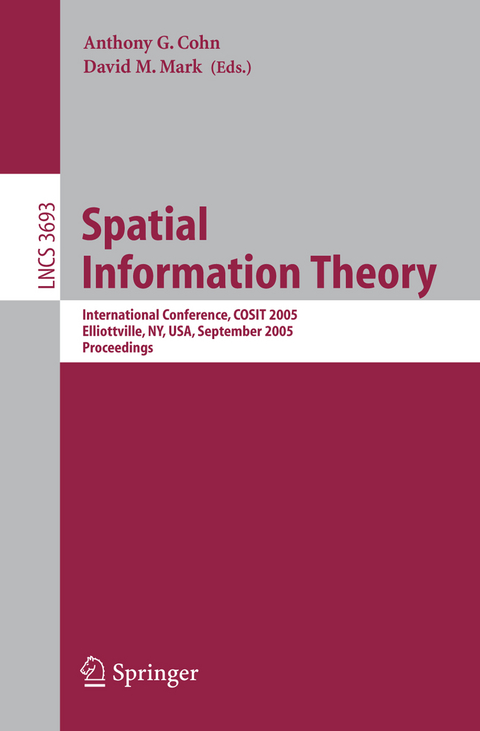
Spatial Information Theory
Springer Berlin (Verlag)
978-3-540-28964-7 (ISBN)
Vagueness, Uncertainty, and Gradation.- Anchoring: A New Approach to Handling Indeterminate Location in GIS.- Gradation and Map Analysis in Area-Class Maps.- Simulation of Obfuscation and Negotiation for Location Privacy.- Paths and Routes.- Investigating the Need for Eliminatory Constraints in the User Interface of Bicycle Route Planners.- Path Memory in Real-World and Virtual Settings.- Shortest Path Search from a Physical Perspective.- Ontology and Semantics.- Operationalising 'Sense of Place' as a Cognitive Operator for Semantics in Place-Based Ontologies.- Data-Driven Matching of Geospatial Schemas.- The Role of Spatial Relations in Automating the Semantic Annotation of Geodata.- Ontology and Spatial Relations.- Anatomical Information Science.- Matching Names and Definitions of Topological Operators.- Spatial Relations Between Classes of Individuals.- Spatial Reasoning.- Casl Specifications of Qualitative Calculi.- A Spatial Form of Diversity.- Structure and Semantics of Arrow Diagrams.- Cognitive Maps and Spatial Reasoning.- Cognitive Maps Are over 60.- Categorical Methods in Qualitative Reasoning: The Case for Weak Representations.- On Internal Cardinal Direction Relations.- Time, Change, and Dynamics.- Dynamic Collectives and Their Collective Dynamics.- A Linguistics-Based Framework for Modeling Spatio-temporal Occurrences and Purposive Change.- Ordering Events for Dynamic Geospatial Domains.- Landmarks and Navigation.- Structural Salience of Landmarks for Route Directions.- Expert and Non-expert Knowledge of Loosely Structured Environments.- Landmark Extraction: A Web Mining Approach.- Geographic Information.- Satellite Images - A Source for Social Scientists? On Handling Multiple Conceptualisations of Space in Geographical Information Systems.- 3DTopographic Data Modelling: Why Rigidity Is Preferable to Pragmatism.- Morse-Smale Decompositions for Modeling Terrain Knowledge.- Spatial Behavior.- 2D-3D MultiAgent GeoSimulation with Knowledge-Based Agents of Customers' Shopping Behavior in a Shopping Mall.- Memory for Spatial Location: Influences of Environmental Cues and Task Field Rotation.- Network and Psychological Effects in Urban Movement.- Abstracts of Keynote Talks.- Probabilistic Techniques for Mobile Robot Navigation.- Spatial Language, Spatial Thought: Parallels in Path Structure.
| Erscheint lt. Verlag | 1.9.2005 |
|---|---|
| Reihe/Serie | Information Systems and Applications, incl. Internet/Web, and HCI | Lecture Notes in Computer Science |
| Zusatzinfo | XII, 500 p. |
| Verlagsort | Berlin |
| Sprache | englisch |
| Maße | 155 x 235 mm |
| Gewicht | 1570 g |
| Themenwelt | Mathematik / Informatik ► Informatik ► Datenbanken |
| Informatik ► Theorie / Studium ► Algorithmen | |
| Schlagworte | data structures • Geographic Information • GIS • information system • Information Theory • Linguistics • Mobile Robot • Ontology • robot • Robot Navigation • Satellite • Spatial behavior • Spatial Cognition • spatial data representation • Spatial Information Processing • spatial information retrieval • Spatial Reasoning • spatio-temporal reasoning • Web mining |
| ISBN-10 | 3-540-28964-X / 354028964X |
| ISBN-13 | 978-3-540-28964-7 / 9783540289647 |
| Zustand | Neuware |
| Haben Sie eine Frage zum Produkt? |
aus dem Bereich


